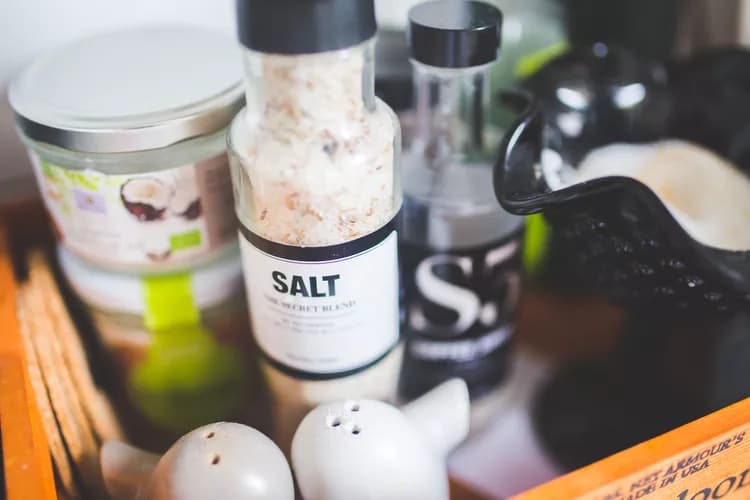Sodium is a component of table salt or sea salt, which is also known as sodium chloride (NaCl). It is a vital body electrolyte found in the blood. Sodium is responsible for keeping fluid balance outside the cells, thereby maintaining extracellular volume. It also regulates the cell membrane potential and enables the active transportation of substances across cell membranes. The pressure and volume of blood are controlled by sodium; too much sodium can increase blood volume, leading to hypertension. Sodium is also indispensable to the function of muscles. Sodium, potassium, and chloride are all vital minerals that are essential for the conduction of electrical impulses through the nervous system.
Low sodium levels in the body can cause symptoms such as cramping of muscles, restlessness, nausea, fatigue, and muscular spasms. Severe deficiency can cause hallucinations, and reduced focus and consciousness that can even move to a comatose state. Hence, it is very important to maintain sodium levels in the body.
As per the U.S. Food and Drug Administration, nearly 77% of the sodium intake of an average American comes from consuming packaged and restaurant foods. The American Food and Nutrition Board recommends a daily intake of 1.5 grams of sodium for an adult, with an upper limit of 2.3 grams. The recommended values hold for lactating mothers and pregnant women too. We get most of our sodium through salt (either table salt or sea salt) and food additives that are used during the process of food preparation. However, an excess intake of sodium may lead to high blood pressure, severely affect the cardiovascular system, and the kidneys, and cause an excess buildup of fluids in people with certain conditions.
Many common food additives, such as baking soda, sodium nitrite (preservative), and monosodium glutamate (used to enhance flavor), contain sodium. Many processed foods and snacks contain a high quantity of such additives, thus implying that they are high-sodium foods. Such processed foods include white bread, salted nuts, chips, sauces, canned food items, butter, margarine, salted meat and fish, pickles, burgers, pizzas, rolls, sandwiches, cheese, tomato ketchup, sauce, bacon, and ham.
The following is a list of foods high in sodium:
- Milk and cheese
- Cocoa powder, drinking chocolate, and caramel
- Cornflakes and breakfast cereals
- Puffed rice
- Eggs
- Oysters and boiled prawns
- Olives in brine solution
Fast foods, canned and baked food items, processed foods, sauces, garnishes, and spreads are all high sodium foods that are harmful to one’s health. Nevertheless, it has been observed that a higher potassium intake may offset some of the negative effects sodium has on blood pressure. Despite the above, it is always recommended to take the advice of a suitable healthcare professional before bringing any alteration to your regular food habits such as a low sodium diet.
References:
Weast RC, ed. CRC handbook of chemistry and physics, 67th ed. Boca Raton, FL, CRC Press, 1986.
Fischbach FT, Dunning MB III, eds. (2009). Manual of Laboratory and Diagnostic Tests, 8th ed. Philadelphia: Lippincott Williams and Wilkins.
Altschul AM, Grommet JK. Food choices for lowering sodium intake. Hypertension 1982 Sep-Oct;4(5 Pt 2):III116-20
Clinical disorders of sodium, potassium, chloride, and sulfur metabolism. Diagnostic approach in children. Chan JC. Urology. 1978 Nov; 12(5):504-8.
The major electrolytes: sodium, potassium, and chloride. Terry J. J Intraven Nurs. 1994 Sep-Oct; 17(5):240-7.
http://www.cdc.gov/salt/food.htm (accessed on 11/23/2014)
http://www.fda.gov/Food/ResourcesForYou/Consumers/ucm315393.htm (accessed on 11/23/2014)
https://www.nrv.gov.au/nutrients/sodium (accessed on 11/23/2014)
Helpful Peer-Reviewed Medical Articles:
Karppanen, H., & Mervaala, E. (2006). Sodium intake and hypertension.Progress in cardiovascular diseases, 49(2), 59-75.
Food Standard Agency. (2014). McCance and Widdowson's the composition of foods. Royal Society of Chemistry.
Jiménez-Colmenero, F., Carballo, J., & Cofrades, S. (2001). Healthier meat and meat products: their role as functional foods. Meat science, 59(1), 5-13.
Adrogué, H. J., & Madias, N. E. (2007). Sodium and potassium in the pathogenesis of hypertension. New England Journal of Medicine, 356(19), 1966-1978.
Aburto, N. J., Ziolkovska, A., Hooper, L., Elliott, P., Cappuccio, F. P., & Meerpohl, J. J. (2013). Effect of lower sodium intake on health: systematic review and meta-analyses.
Related Articles
Test Your Knowledge
Asked by users
Related Centers
Related Specialties
Related Physicians
Related Procedures
Related Resources
Join DoveHubs
and connect with fellow professionals


0 Comments
Please log in to post a comment.